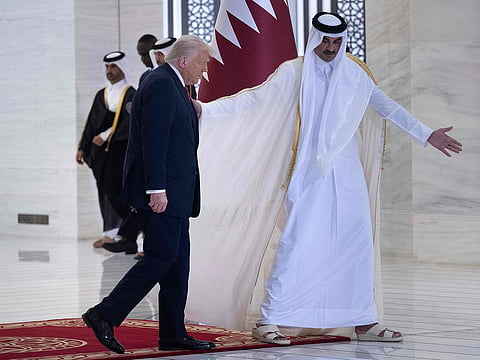Trump says expects Iran diplomacy will ‘work out’
But for that to happen, 'it must stop sponsoring terror, halt its bloody proxy wars'

DOHA: US President Donald Trump voiced hope on Wednesday that diplomatic efforts for a nuclear deal with Iran would succeed, after he held talks with Qatar’s emir.
“I have a feeling it’s going to work out,” Trump said in Doha, following the resumption last month of negotiations with Iran seeking to reach a deal.
Earlier, Trump, however, urged vigorous enforcement of sanctions on Iran.
“I want to make a deal with Iran. I want to do something, if it’s possible,” Trump told a summit of Gulf Arab leaders in Riyadh.
“But for that to happen, it must stop sponsoring terror, halt its bloody proxy wars, and permanently and verifiably cease its pursuit of nuclear weapons.
“I’m strongly urging all nations to join us in fully and totally enforcing the sanctions that I just placed on Iran,” he said.
It was unclear what he meant by “just placed” but the Trump administration in recent weeks has imposed sanctions on a series of entities and individuals linked to Iran’s oil industry and nuclear programme.
In 2018, Trump walked out of a landmark agreement between major powers and Iran that gave it sanctions relief in return for UN-monitored restrictions on its nuclear activities.
He slapped sweeping sanctions on Iran, including secondary measures against any country that buys Iranian oil.
Trump said that such secondary sanctions “are in certain ways even more devastating” than direct sanctions on Iran.
The Trump administration has held four rounds of talks with Iran, as the president seeks to avert a threatened Israeli military strike on Tehran’s nuclear programme.
Both the United States and Iran have said that the talks took place in a positive atmosphere but they have not appeared to have gone in depth on technical aspects of an accord.
Iran, which denies it is pursuing nuclear weapons, said it also expects to hold talks with Britain, France and Germany on Friday in Turkey.
Fresh talks with EU
Meanwhile, Iran will hold a fresh round of nuclear talks with European powers in Turkey later this week, its foreign ministry said on Wednesday.
The talks with Britain, France and Germany would be held in Istanbul on Friday, ministry spokesman Esmaeil Baqaei said, quoted by state news agency IRNA.
French diplomatic sources gave the same information, but there was still no word from Berlin or London on the meeting which was originally slated for earlier this month but postponed.
Iranian Foreign Minister Abbas Araghchi said the talks would be held “at the level of deputy foreign ministers”.
The European nations - known as the E3 - were among the world powers that negotiated the landmark 2015 Iran nuclear deal along with China, Russia and the United States.
Trump, in his first term as president, effectively torpedoed the accord in 2018 by unilaterally withdrawing the United States.
Since returning to office in January, Trump has revived his “maximum pressure” campaign on Tehran, backing nuclear diplomacy but warning of military action if it fails.
Iran has held several discreet meetings on the nuclear with the E3 since late last year - most recently in February in Geneva - ahead of indirect negotiations with Washington that began on April 12.
“While we continue the dialogue with the United States, we are also ready to talk with the Europeans,” Araghchi said.
“Unfortunately, the Europeans themselves have become somewhat isolated in these negotiations with their own policies,” he added, without elaborating.
“We do not want such a situation and that’s why we have continued our negotiations” with them, he said.
Snapback sanctions
Friday’s meeting will follow the latest round of Oman-mediated Iran-US talks on Sunday, which Tehran described as “difficult but useful” while a US official said Washington was “encouraged.”
Iran and the United States have so far held four rounds of talks, the highest-level contact in years between the long-time foes, since the US abandoned the 2015 nuclear accord.
Western countries, including the United States, have long accused Iran of seeking to acquire atomic weapons, while Iran insists its nuclear programme is for peaceful purposes.
European governments are currently weighing whether to trigger the “snapback” mechanism under the 2015 deal, which would reinstate UN sanctions in response to Iranian non-compliance - an option that expires in October.
On Tuesday, Trump criticised Iran’s leadership, regional role, alleged mismanagement, and threatened to slash its oil exports if nuclear talks fail.
“Iran’s leaders have focused on stealing their people’s wealth to fund terror and bloodshed abroad,” said Trump at a Saudi investment forum.
He reiterated his willingness to “make a deal with Iran” but threatened to impose “massive maximum pressure”, including driving Iranian oil exports to zero if talks failed.
Araghchi dismissed the remarks as a “very deceptive view” of Iran and blamed US sanctions, pressure and both military and non-military threats for hindering the country’s progress.



